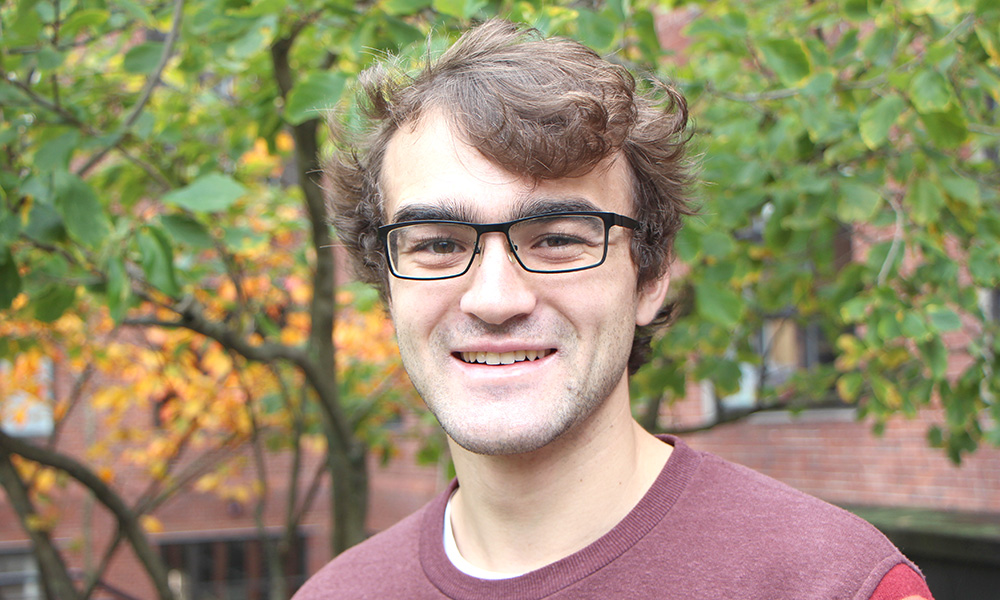The Board of Tutors in Biochemical Sciences has awarded the Henderson Prize for undergraduate thesis work to CPB concentrator William Stainier (‘21).
Named for Harvard professor and pioneering biochemist Lawrence J. Henderson (1878-1942), the Henderson Prize celebrates the achievements of students who pursue research in chemical biology. Winners of the prize receive $500, a framed certificate, and a copy of Henderson’s book The Fitness of the Environment (1913).
CPB concentrator Ralph Estanboullieh (‘21) and MCB concentrator Simon Schnabl (‘21) were named as runners-up.
Stainier, whose thesis also garnered the Hoopes Prize, first heard that he won the Henderson Prize via a text from another concentrator in his MCB/CPB cohort. He says the moment reflects how tight-knit the MCB/CPB concentrators have become.
The thesis, titled “The Natural Viral Environment of Caenorhabditis elegans: Interactions between RNA Interference, the Dauer State, and Orsay Virus Infection,” explores how antiviral RNA interference (RNAi) signals contribute to defense against Orsay virus in C. elegans. It also investigates Orsay virus infection during a larval phase of C. elegans development called the Dauer State.
MCB faculty and Stainier’s thesis advisor Craig Hunter explains, “William proposed that if viruses could not infect or persist in dispersal-stage [i.e. Dauer State] larvae then that would explain the scarcity of nematode viruses. However, his careful and thorough experiments showed that dispersal stage larvae could both harbor viruses and be infected by viruses.”
Stainier says the results discounting his initial hypothesis were disappointing at first but adds that it’s gratifying to be recognized for a project with “negative” results. “Though I started out with an attractive hypothesis explaining the small number of known C. elegans infecting viruses, my data ultimately didn’t support that hypothesis,” he says. “Yet it was great to receive the Henderson Prize for my thesis and emphasize that science isn’t all about ‘positive’ results that show what you’re expecting!”
Hunter speaks ebulliently about the recognition that Stainier is receiving for his thesis work. “William did nearly all his experiments during the pandemic,” Hunter says. “He selected the questions and designed the experiments in the last few months of 2020, but his first big experiment was cut short when the university closed in March. He planned his time very well in the Fall and made tremendous progress, even under our COVID restriction.”
“The whole lab was excited by his Hoopes win, but I can’t wait to share the news about the Henderson Prize,” Hunter adds. “William worked very hard on his thesis, producing beautiful figures and extremely detailed descriptions—as one of his reviewers noted, ‘even Craig Hunter himself could repeat the experiment easily.’”
Stainier says that a workshop on how to make figures led by Assistant Director of Undergraduate Studies in Neuroscience Ryan Draft and Assistant Director of Undergraduate Studies in MCB and CPB Dominic Mao was helpful for designing figures, as were skills he acquired through science coursework. “Learning to take detailed lab notes, discussing papers in Harvard classes and thinking about how to present my data in a clear and transparent way (both in classes and in lab) were all helpful in writing my thesis,” Stainier says. “I spent a lot of my time thinking about whether the way I was presenting my data was overstating the level of confidence I had in them, and thinking about how to be very deliberate with my statistical analyses.”
He adds that MCB 112: Biological Data Analysis, taught by MCB Chair Sean Eddy, instilled the importance of questioning frequently-used biostatistical techniques and understanding the assumptions underpinning statistical tests.
Stainier expressed his appreciation for the people who make up the CPB and MCB community. “I would again like to thank the Hunter lab, my CPB tutor Martha Bulyk, and the rest of the MCB/CPB community for their support these past years,” he says. “And a big congratulations to the rest of the MCB/CPB thesis writers and particularly Ralph [Estanboullieh] and Simon [Schnabl], whom I have known since my first MCB classes in my first year!”
Congratulations to William Stainier!


